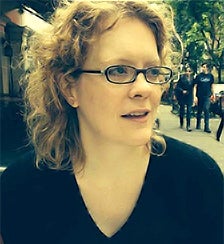When we think about how authors can promote their books, we often think about their websites and social media reach. But did you know that some of your biggest assets may be closer to home: your friends, family, acquaintances, and other connections? We caught up with Christina Foxley, senior marketing manager for Harmony Books, to find out what advice she typically offers to help authors build their networks and create ambassadors for their books.
Christina, why is it important for authors to build their networks and create ambassadors for their books?
 Today’s media marketplace is more crowded than ever. While this creates challenges for promoting book titles, it also creates many opportunities. Authors very often have great networks of friends, family, and acquaintances that are potentially more influential than they might appear at first glance. The great part is that because these people already have a relationship with the author, they are often happy to help. Your network could include your friends and family members who love to tweet and post photos on Instagram, your colleagues who run their schools’ PTAs, or your dog walker who runs an online book club. So, you already have many connections you can use to promote your book.
Today’s media marketplace is more crowded than ever. While this creates challenges for promoting book titles, it also creates many opportunities. Authors very often have great networks of friends, family, and acquaintances that are potentially more influential than they might appear at first glance. The great part is that because these people already have a relationship with the author, they are often happy to help. Your network could include your friends and family members who love to tweet and post photos on Instagram, your colleagues who run their schools’ PTAs, or your dog walker who runs an online book club. So, you already have many connections you can use to promote your book.
Do you think this approach works for smaller authors, or is it best for bigger authors who are already well connected?
I absolutely think this approach works for first-time authors. If authors have smaller online presences, it is even more important for them to get their networks talking about their books.
What is the right time and place to start thinking about this?
A good time to start is six to eight months in advance of the publication of your book. And a good place to start is by thinking about the channels that you already have and the people that you know:
- Do you have a website?
- Do you have an email newsletter?
- Do you have followers on social media?
- Have you worked with partners who might help you promote your title, perhaps in return for something else?
- Who in your network might be willing to become an ambassador for your book?
How can authors identify who in their networks might be able to help?
Create a spreadsheet of all your contacts. List everyone who might be interested in supporting your book, and include as much info about each person as possible.
Consider the ways your contacts might be able to help. Think outside the box. People are often willing to help as long as you make it easy for them. If you are a member of your local neighborhood association, maybe a fellow board member might write a brief review of your book for the association’s email newsletter. Perhaps you have a friend with many social media followers, whom you can provide with a suggested tweet and hashtag. Or maybe you have been interviewed in the past by a local newspaper or blogger. These folks should be listed on your spreadsheet so you can talk to your publishing team about the best way to reach out to them.
How do I make it easy for people to talk about my book?
One good way to do this is to offer people different ways to help, so they can find the one they feel most comfortable with. Examples could include:
- Providing people with content they can post on social media or on websites—for example, an excerpt, shareable quotes, an infographic, graphics from your book, or tips
- Asking contacts who might have influence over a website to post a banner advert promoting the book
- Offering advance reader’s copies to people who might be able to spread the word
If your contacts are likely to see significant traffic from the links they provide, remind them that they can earn affiliate revenue by linking to your book on a retailer’s website.
If your book would be a great book club pick, consider offering reading guides and/or an author Q&A. In the past, we have also offered recipes for food or cocktails complementary to the book to help make a book club discussion even more memorable.
If you have a lot of traffic to your own website, consider putting bonus content on a page where people can easily download it. If you don’t have a site and the content files are large, Google Drive is a good free solution.
How should authors decide what additional content would be most useful, and how can they create it?
The best approach to additional content will depend on the nature of the book, the author, and the audience we are trying to reach. Your publishing team can help you think through what content will be most useful and when to reach out with it.
Often your marketing team will help design any assets, especially if this is agreed upon early in the publishing process. If not, simple tools such as Picmonkey, Pixlr, and even Microsoft Paint can be used as an alternative to Photoshop for the creation of graphics and banner ads.
Thanks, Christina! For more examples of different authors and how we have helped them build their network, check out the full recording of the webinar.
Christina Foxley is Senior Marketing Manager for Harmony Books, a Crown Publishing Group imprint.
Sophie McNeill is part of the Digital Marketing and Channel Development team.


